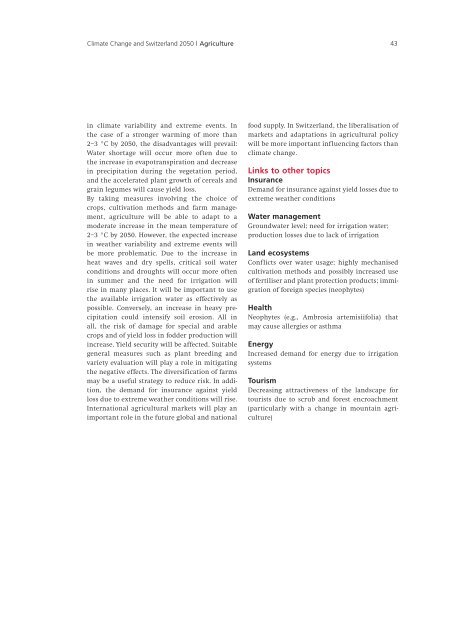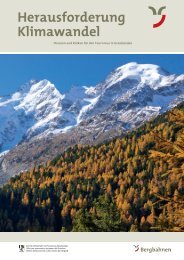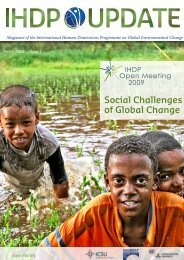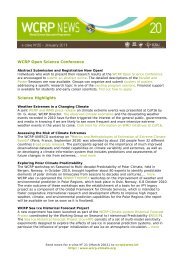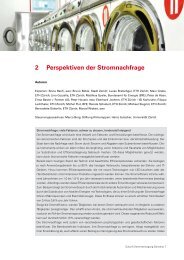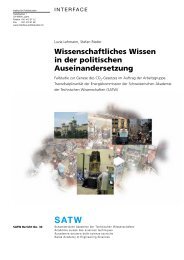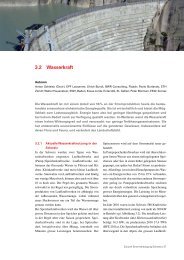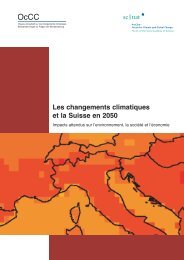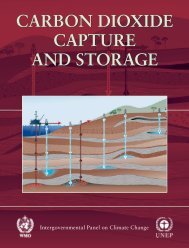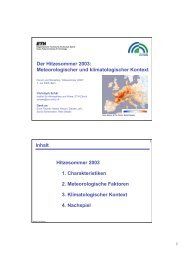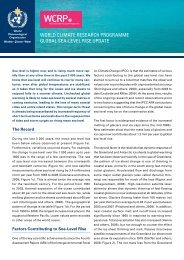Climate Change and Switzerland 2050 - OcCC - SCNAT
Climate Change and Switzerland 2050 - OcCC - SCNAT
Climate Change and Switzerland 2050 - OcCC - SCNAT
You also want an ePaper? Increase the reach of your titles
YUMPU automatically turns print PDFs into web optimized ePapers that Google loves.
<strong>Climate</strong> <strong>Change</strong> <strong>and</strong> Switzerl<strong>and</strong> <strong>2050</strong> | Agriculture 43<br />
in climate variability <strong>and</strong> extreme events. In<br />
the case of a stronger warming of more than<br />
2–3 °C by <strong>2050</strong>, the disadvantages will prevail:<br />
Water shortage will occur more often due to<br />
the increase in evapotranspiration <strong>and</strong> decrease<br />
in precipitation during the vegetation period,<br />
<strong>and</strong> the accelerated plant growth of cereals <strong>and</strong><br />
grain legumes will cause yield loss.<br />
By taking measures involving the choice of<br />
crops, cultivation methods <strong>and</strong> farm management,<br />
agriculture will be able to adapt to a<br />
moderate increase in the mean temperature of<br />
2–3 °C by <strong>2050</strong>. However, the expected increase<br />
in weather variability <strong>and</strong> extreme events will<br />
be more problematic. Due to the increase in<br />
heat waves <strong>and</strong> dry spells, critical soil water<br />
conditions <strong>and</strong> droughts will occur more often<br />
in summer <strong>and</strong> the need for irrigation will<br />
rise in many places. It will be important to use<br />
the available irrigation water as effectively as<br />
possible. Conversely, an increase in heavy precipitation<br />
could intensify soil erosion. All in<br />
all, the risk of damage for special <strong>and</strong> arable<br />
crops <strong>and</strong> of yield loss in fodder production will<br />
increase. Yield security will be affected. Suitable<br />
general measures such as plant breeding <strong>and</strong><br />
variety evaluation will play a role in mitigating<br />
the negative effects. The diversification of farms<br />
may be a useful strategy to reduce risk. In addition,<br />
the dem<strong>and</strong> for insurance against yield<br />
loss due to extreme weather conditions will rise.<br />
International agricultural markets will play an<br />
important role in the future global <strong>and</strong> national<br />
food supply. In Switzerl<strong>and</strong>, the liberalisation of<br />
markets <strong>and</strong> adaptations in agricultural policy<br />
will be more important influencing factors than<br />
climate change.<br />
Links to other topics<br />
Insurance<br />
Dem<strong>and</strong> for insurance against yield losses due to<br />
extreme weather conditions<br />
Water management<br />
Groundwater level; need for irrigation water;<br />
production losses due to lack of irrigation<br />
L<strong>and</strong> ecosystems<br />
Conflicts over water usage; highly mechanised<br />
cultivation methods <strong>and</strong> possibly increased use<br />
of fertiliser <strong>and</strong> plant protection products; immigration<br />
of foreign species (neophytes)<br />
Health<br />
Neophytes (e.g., Ambrosia artemisiifolia) that<br />
may cause allergies or asthma<br />
Energy<br />
Increased dem<strong>and</strong> for energy due to irrigation<br />
systems<br />
Tourism<br />
Decreasing attractiveness of the l<strong>and</strong>scape for<br />
tourists due to scrub <strong>and</strong> forest encroachment<br />
(particularly with a change in mountain agriculture)


